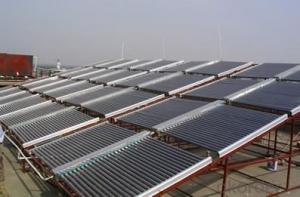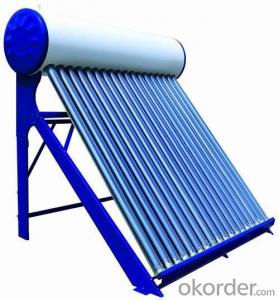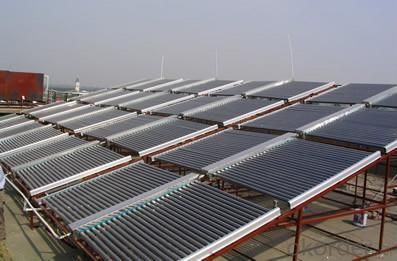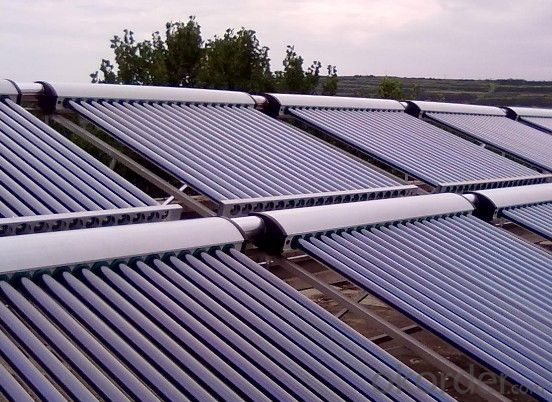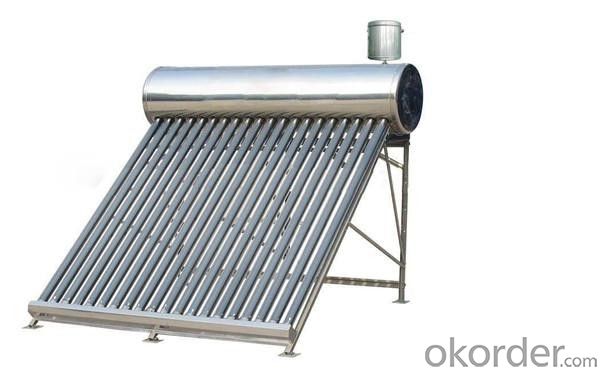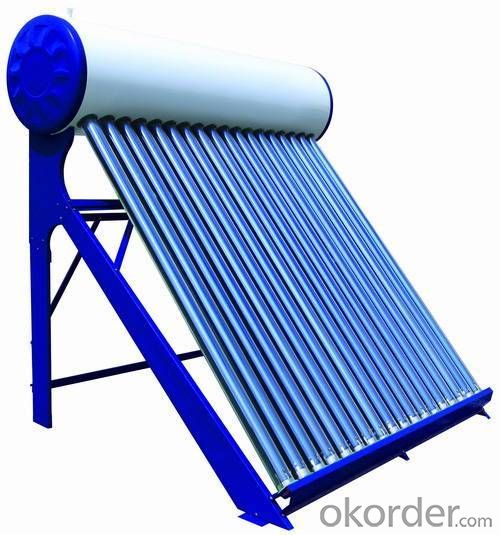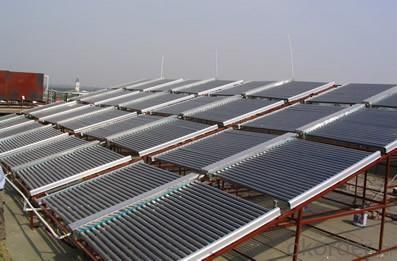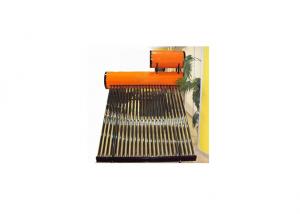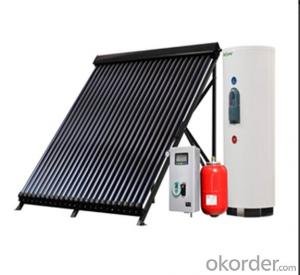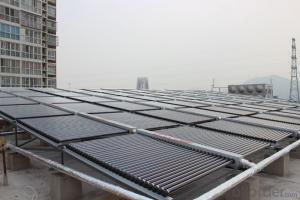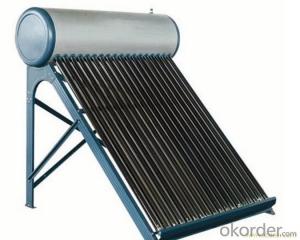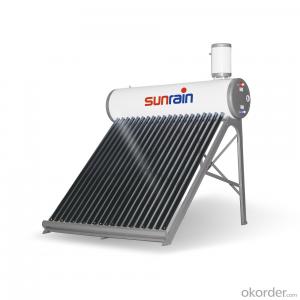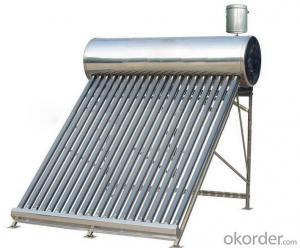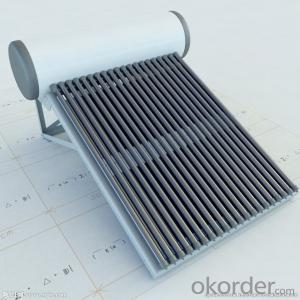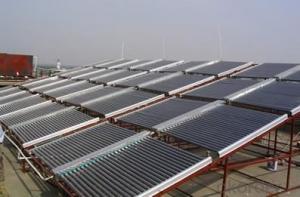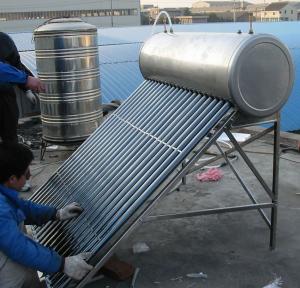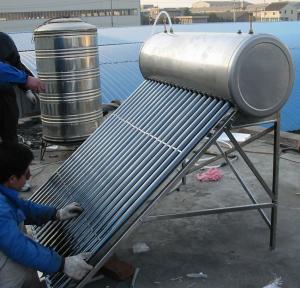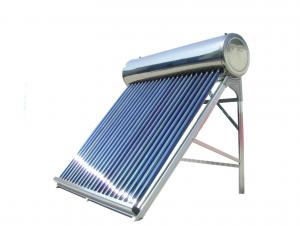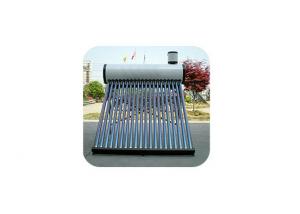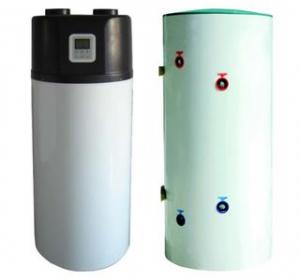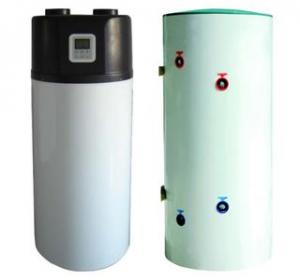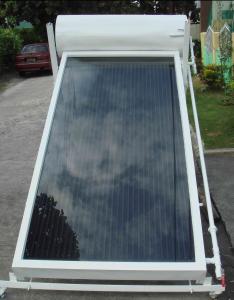20tube Non-Pressure Solar Water Heater Collector - Solar Water Heater Hawaii
- Loading Port:
- China main port
- Payment Terms:
- TT OR LC
- Min Order Qty:
- 10 set
- Supply Capability:
- 10000 set/month
OKorder Service Pledge
OKorder Financial Service
You Might Also Like
Solar water heaters features
1. The upright tank can make the water temperature to a high level. It can hot the water instantly
2. The tank inside the building, the hot water loses less energy than the normal one
3. The solar collector and the tank of solar water heater is separated, that makes the system combine with the building perfectly, which will reduce the sightseeing for the building and environment around
4. Back up with electric heater so that in the day without sunshine hot water can also be used
5. Can be combined with gas or electric heater
6. Max. Pressure: 12bar; Operating Pressure: 6 bar
7. It can be used for other function, such as warming
Solar water heaters working principle
1. The solar collector absorbs solar energy and transmits it to the solar water heater tank through circulation
2. When the temperature of the collector reaches the set value, the controller starts the circulation pump automatically
3. The circulation pump makes heat-conducting liquid circulate automatically
4. The heat-conducting liquid transfers heat to water by lower heat exchanger in the water tank.
5. When the temperature difference between solar collector and heat pipe solar water heaters tank doesn't reach the set value, the circulation pump will be shut automatically
6. In case the temperature of the water tank does not reach Tmax, Electric Heating Element will start to work automatically
Solar water heaters working station component:
1. Operating screen
2. Manometer
3. Pump speed adjust switches
4. Temperature difference circulation pump
5. Flow rate indicator
6. Return circuit connector
7. Safety valve
8. Expansion vessel connector9. Return circuit connector
10. Wall mounting
11. Expansion vessel:8L
12. Pressure resistance: 10 bar pressure for expansion vessel
Solar water heaters specification:
Description | solar water heaters |
Material of out manifold | 0.55mm thickness color steel/ fluorine carbon steel |
Material of inner tank | Food grade 2.0 mm thickness SUS304 stainless steel |
Tank insulating layer | 40mm 45kg/m³ high-density polyurethane foamed |
Inlet and outlet hole | Male G1'' |
Max pressure | 0.6 Mpa |
Solar collector tube | 3.3 Borosilicate glass with N/Al coating |
Thickness of glass tube | 1.6mm |
Vacuum tube tightness | P≤0.005 Pa |
Absorption | as=0.93-0.96 (AM1.5) |
Emission ratio | εh=0.04-0.06 (80C±5C) |
Idle sunning property parameters | Y=220~260m2.C/KW |
Average heat loss coefficient | ULT=0.6~0.7W/(m2.C) |
Bracket: | 2.0mm thickness aluminum alloy |
Tank weight | 75KGS |
Tank size | 560mm Dia x 1810mm Height |
Tank capacity | 300L |
Solar collector | 2pcs 58x1800x15tube solar collector |
Absorber area | 2.811 m² |
Working station | SP116 working station |
Heat exchanger length | Upper:12m, Underside:18m |
Solar water heaters details show:
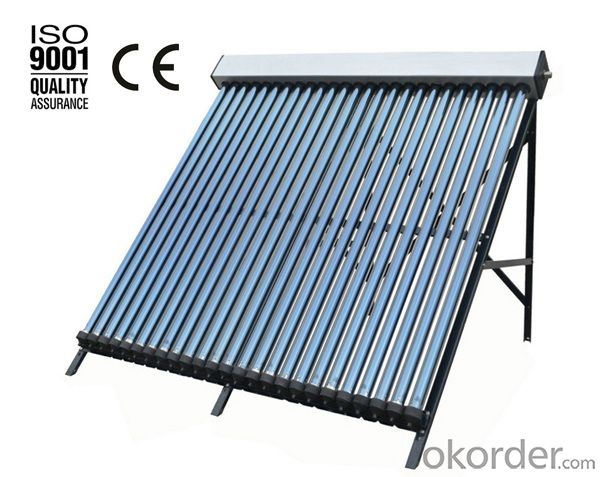
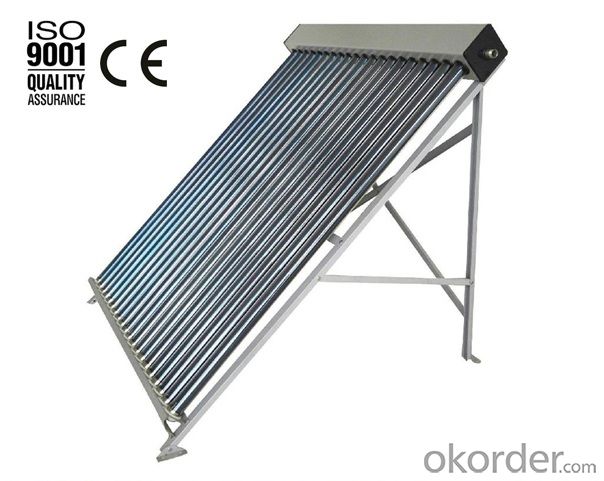
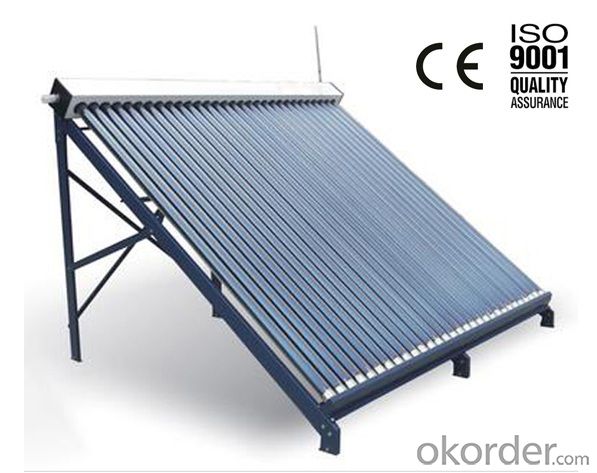
Benefits of this kind of solar water heaters:
1. Prolong the life of your existing water heater
2.Costs less than an electric, gas or oil water heater
3.No maintenance required
4.Lasts longer than a traditional hot water heater
5.Reduce your water heating costs
- Q: Can a solar water heater be used in areas with shading from trees or nearby buildings?
- Yes, a solar water heater can still be used in areas with shading from trees or nearby buildings. However, the efficiency of the solar water heater may be reduced due to the decreased access to direct sunlight. It is important to ensure that the solar panels are positioned in an area where they receive maximum sunlight throughout the day to maximize the heater's performance.
- Q: Can a solar water heater be used in areas with limited access to roof space for installation?
- Yes, a solar water heater can be used in areas with limited access to roof space for installation. In such cases, alternatives like ground-mounted systems or compact solar water heaters can be utilized to maximize the use of available space.
- Q: Are there any fire hazards associated with solar water heaters?
- Yes, there are potential fire hazards associated with solar water heaters. These hazards can arise from electrical malfunctions, overheating of the system, or improper installation. However, when properly installed and maintained, the risks are minimal and can be effectively managed through safety measures and regular inspections.
- Q: Can a solar water heater be used in areas with limited wind resources?
- Yes, a solar water heater can be used in areas with limited wind resources. Solar water heaters use the energy from the sun to heat water, so they do not rely on wind resources for their operation. As long as there is sufficient sunlight, a solar water heater can effectively heat water, regardless of the wind conditions in the area. Therefore, even in areas with limited wind resources, solar water heaters can be a viable and sustainable option for heating water.
- Q: How does the efficiency of a solar water heater vary with different designs?
- The efficiency of a solar water heater can vary with different designs based on factors such as the collector area, insulation, heat transfer mechanisms, and overall system design. Designs that have larger collector areas and better insulation tend to be more efficient as they can capture and retain more solar energy. Additionally, designs that incorporate efficient heat transfer mechanisms, such as using heat pipes or direct circulation systems, can also improve overall efficiency. Ultimately, the efficiency of a solar water heater is influenced by these design factors and can vary depending on how well they are optimized.
- Q: Can a solar water heater be used in areas with limited access to solar insolation data?
- Yes, a solar water heater can still be used in areas with limited access to solar insolation data. While it may be challenging to accurately estimate the potential solar energy available, solar water heaters can still operate effectively in areas with varying levels of sunlight. It is recommended to use conservative estimates and design the system to be more efficient to compensate for the uncertainty in solar insolation data. Additionally, periodic monitoring and adjustments can be made based on the actual performance of the solar water heater in order to optimize its efficiency.
- Q: Can a solar water heater be used in areas with limited access to spare parts or components?
- Yes, a solar water heater can be used in areas with limited access to spare parts or components. Solar water heaters are simple and robust systems that require minimal maintenance and have few moving parts. They are designed to be durable and reliable, with long lifespans. Even in areas with limited access to spare parts or components, solar water heaters can still function effectively and provide hot water using the energy from the sun.
- Q: Can a solar water heater be used in areas with high snowfall?
- Yes, a solar water heater can be used in areas with high snowfall. However, it may require additional measures to ensure its efficient operation. These can include proper insulation, tilt adjustments to maximize sunlight exposure, and regular maintenance to clear snow buildup.
- Q: How much money can you save with a solar water heater?
- Several factors determine the amount of money that can be saved with a solar water heater. These factors include the size of your household, your current water heating expenses, the efficiency of the solar water heater, and the local climate conditions. On average, a solar water heater can reduce water heating costs by 50% to 80%. This translates to significant savings on your monthly energy bills. For instance, if your monthly water heating expenses amount to $100, installing a solar water heater could save you $50 to $80 per month. Over a year, this could accumulate to savings ranging from $600 to $960. Furthermore, solar water heaters have a longer lifespan compared to traditional water heaters, allowing you to enjoy these cost savings for many years. Additionally, by utilizing solar energy for water heating, you decrease your reliance on fossil fuels, contributing to a greener and more sustainable future. It is worth noting that the initial cost of purchasing and installing a solar water heater may differ depending on the type and size of the system. However, various governments and utility companies offer incentives, tax credits, and rebates to encourage the adoption of renewable energy systems, which can help offset the upfront expenses. Ultimately, the specific amount of money that can be saved with a solar water heater will vary depending on your unique circumstances. Consulting with a professional solar installer is recommended to evaluate your specific situation and determine the potential savings achievable with a solar water heater.
- Q: Can a solar water heater be used in areas with limited access to oil pipelines?
- Yes, a solar water heater can definitely be used in areas with limited access to oil pipelines. In fact, solar water heaters are an excellent alternative to traditional oil-based water heaters in such areas. Solar water heaters utilize the abundant and renewable energy from the sun to heat water, eliminating the need for oil or any other fossil fuels. They consist of solar panels that absorb sunlight and convert it into heat, which is then transferred to water stored in a tank. Since they rely solely on sunlight, solar water heaters can be effectively used even in remote locations without access to oil pipelines or any other energy infrastructure. This makes them an environmentally friendly and cost-effective solution for providing hot water in areas where oil-based heating is not viable. Additionally, solar water heaters have the added advantage of reducing carbon emissions and dependency on fossil fuels, contributing to a greener and more sustainable future.
Send your message to us
20tube Non-Pressure Solar Water Heater Collector - Solar Water Heater Hawaii
- Loading Port:
- China main port
- Payment Terms:
- TT OR LC
- Min Order Qty:
- 10 set
- Supply Capability:
- 10000 set/month
OKorder Service Pledge
OKorder Financial Service
Similar products
Hot products
Hot Searches
Related keywords
